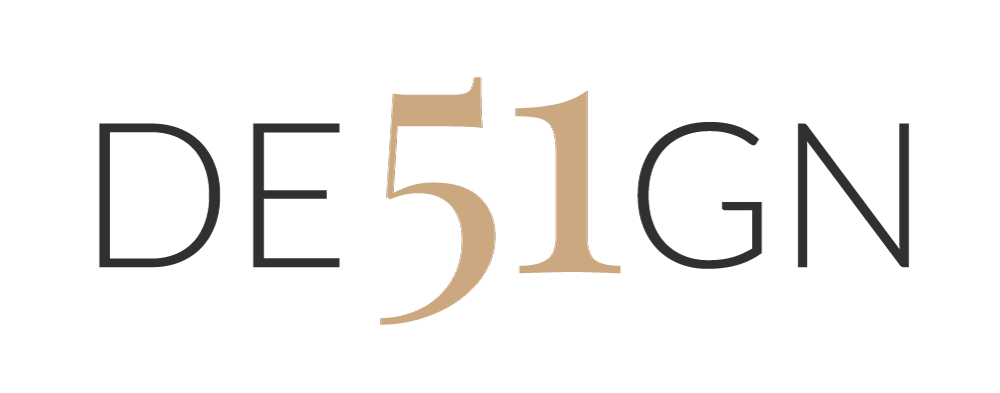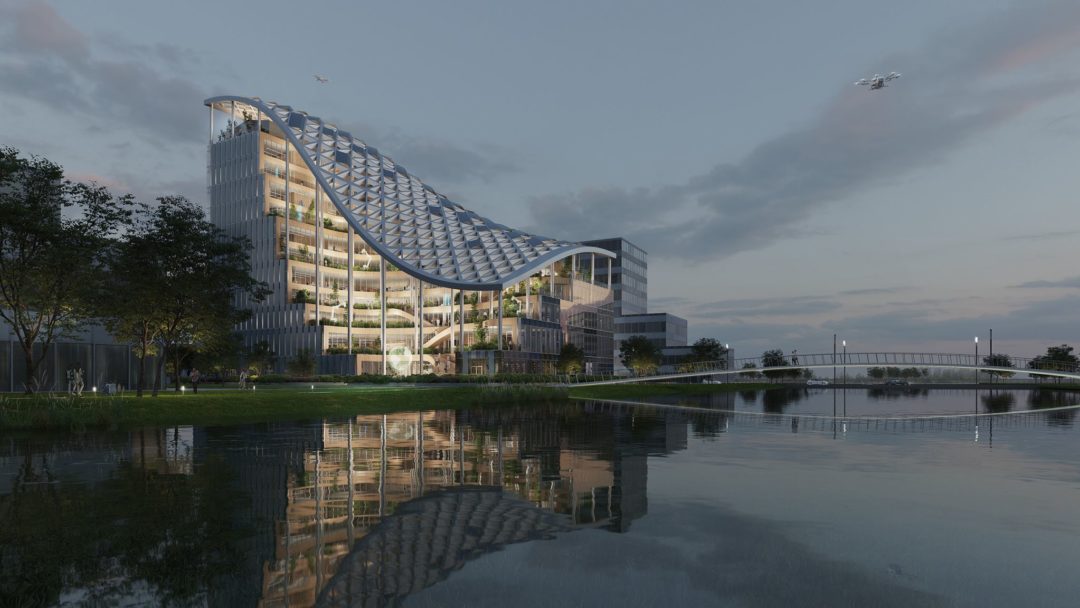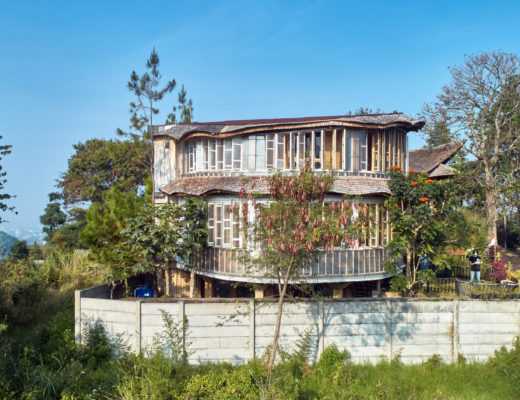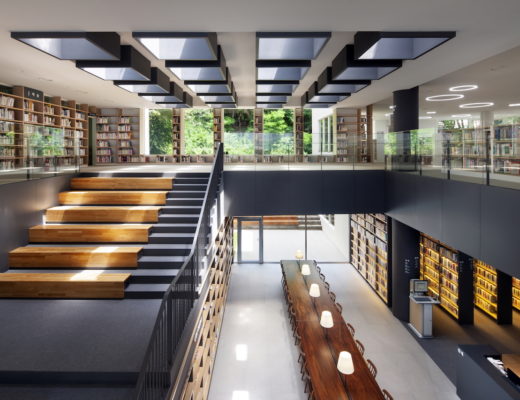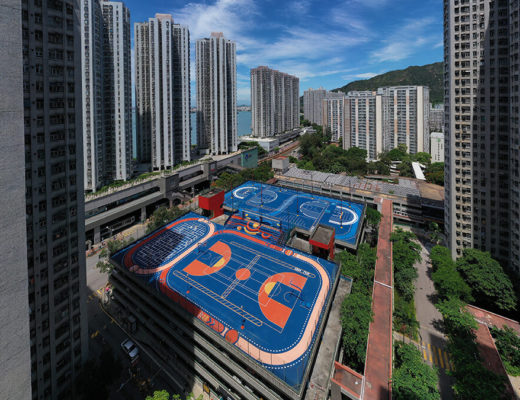The Lankuaikei Agriculture Development (LAD) Headquarters in Shanghai, an 11-storey terraced office building by Dutch practice MVRDV brings together both high- and low-tech sustainability strategies under a swooping technological roof to create a showcase for an agriculture technology company. Located near the lake at the centre of Lingang New Town, the building is conceived as an agricultural oasis in a rapidly developing urban area in Shanghai, and one of China’s greenest, smartest sustainable buildings.
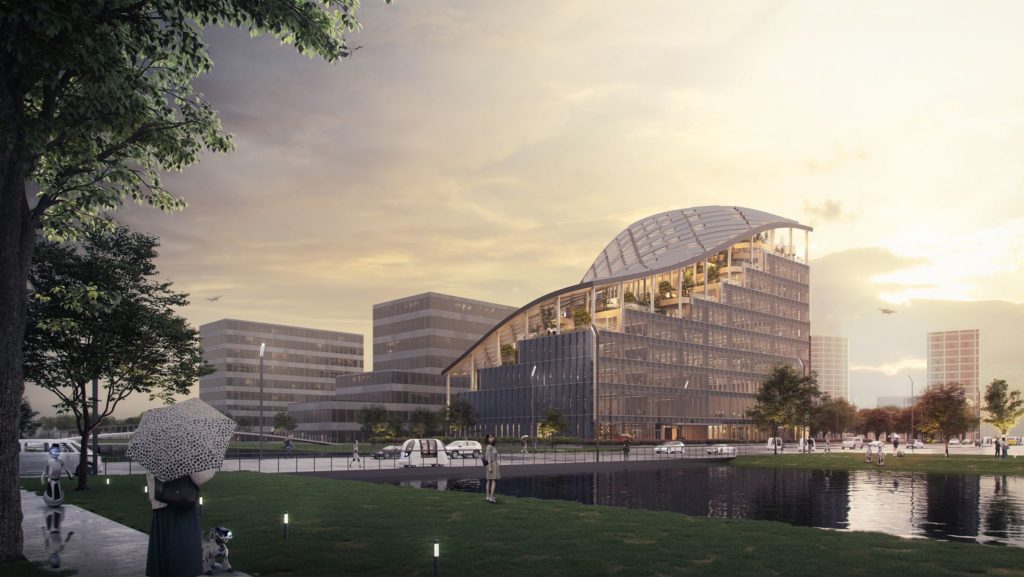
Designed as the research and development headquarters of Chinese agriculture technology Lankuaikei, the LAD HQ is a “sustainable machine” that brings together both high- and low-tech sustainability strategies under a swooping technological roof. The 11-storey building incorporates terraces inspired by Chinese agriculture that serve as outdoor work areas and public exhibition spaces for the company’s research.
Viewed from above, the building is rectangular in plan, yet it is given a striking curved shape by the series of terraces that step down to a courtyard and the main pedestrian entrance on the north side. The terraces are clad in wood and covered in greenery, and they include a publicly accessible route to the top of the building that provides spaces for LAD to showcase its work and research.
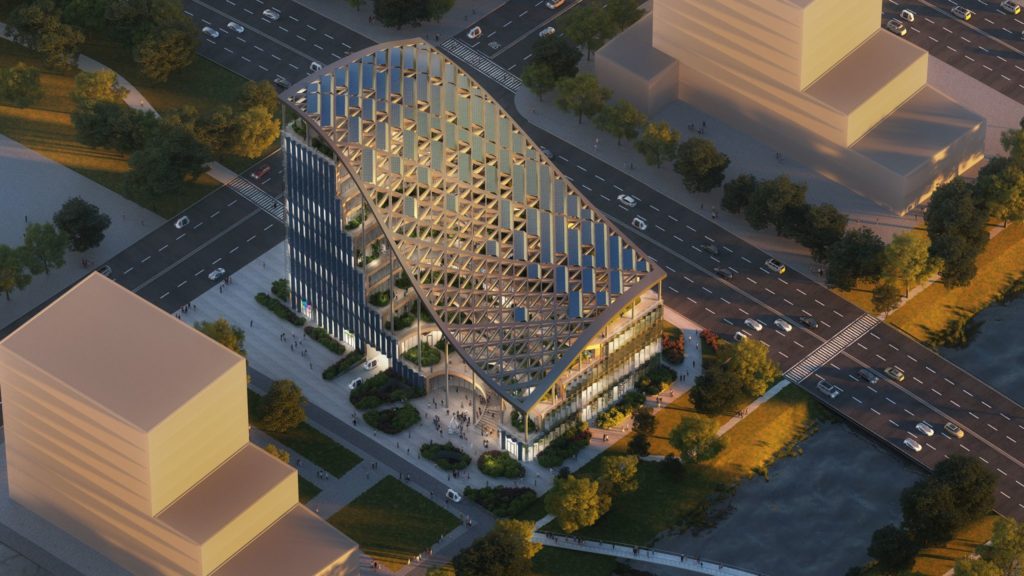
A curving roof structure that follows the shape of the terraces covers the ensemble. On the southern part of the building, this structure supports solar panels, while on the north it is permeable, filtering sunlight but allowing rain to reach the terraces below. On the outer walls, the building’s façade is a pleated arrangement of solar panels and glass, angled to protect the interior from strong summer sunlight while allowing winter sunlight into the interiors. On the building’s southern edge, these walls also help protect the office workers from the noise of the main road outside.
The building is conceived as a “sustainability machine”, confronting a wide variety of challenges both indirectly and directly, with high-tech and low-tech solutions. Through material selection and life-cycle analysis, the embodied carbon of the design will be 40% lower than a typical comparable construction. The roof structure and terraces aid in efficient natural ventilation. This ventilation and the shading strategies reduce energy requirements. Thanks to the solar panels incorporated into the design, the building will, therefore, be almost energy-neutral in operation.
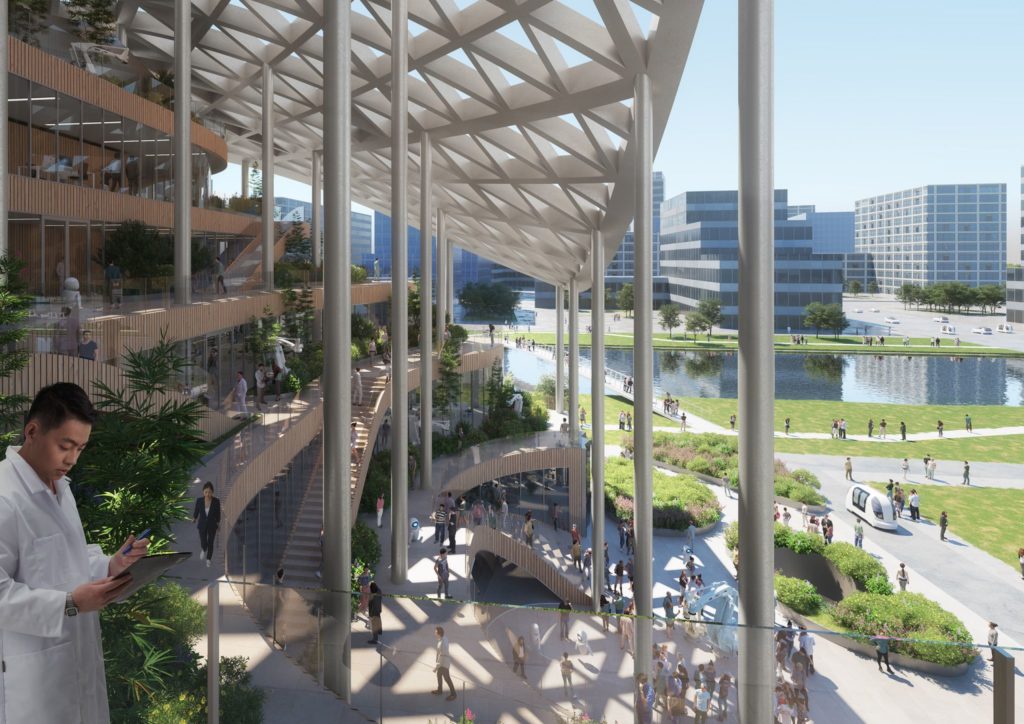
The terraces collect rainwater for use in functions such as toilets, as well as providing biodiversity and healthy working environments thanks to the greenery that extends all the way to the top floors. The design even indirectly contributes to public education and agricultural production, thanks to its role in facilitating the mission of LAD and the exhibition spaces that help manifest their vision.
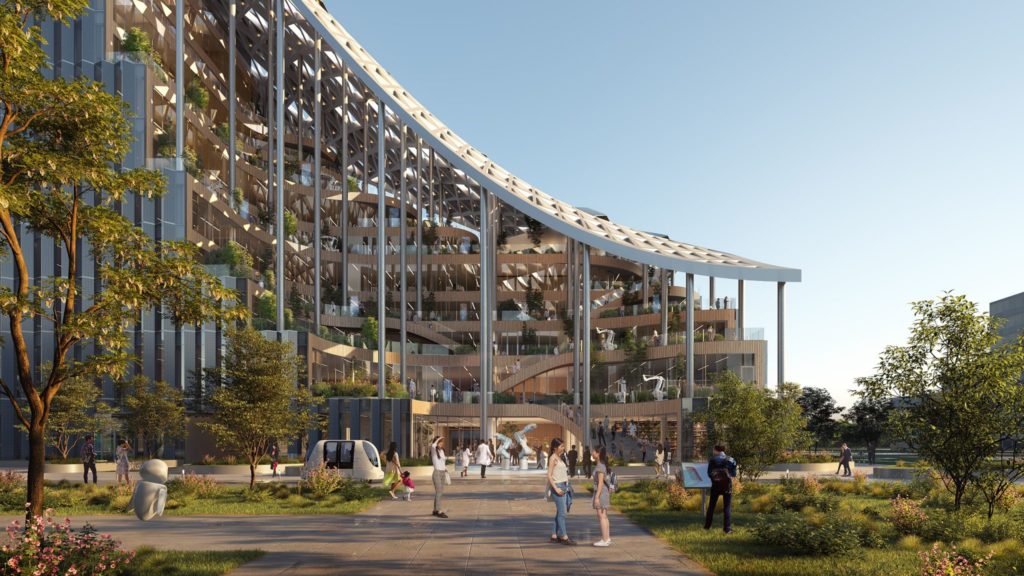
“Working with LAD has been an exciting experience; this HQ building shows architecture in perfect alignment with a company’s mission”, says MVRDV founding partner Jacob van Rijs. “Incorporating sustainability into every surface of a building is an interesting challenge for an architect, and it’s one that as a design team we embraced whole-heartedly. This approach is not just good for the planet, it will also be appreciated by the users of the offices, who will be able to enjoy the pleasant working environment offered by the terraces.”
“MVRDV’s mission is to make cities and landscapes sustainable and future-proof. LAD’s mission and vision are to empower rural revitalisation and food safety in China with LAD knowledge, to explore the mysteries of nature, to protect human health with science and technology. In this cooperation project, we are looking forward to seeing an ‘agricultural oasis’ combining the missions of both companies”, added the president of LAD, Mr Weihua Dong.
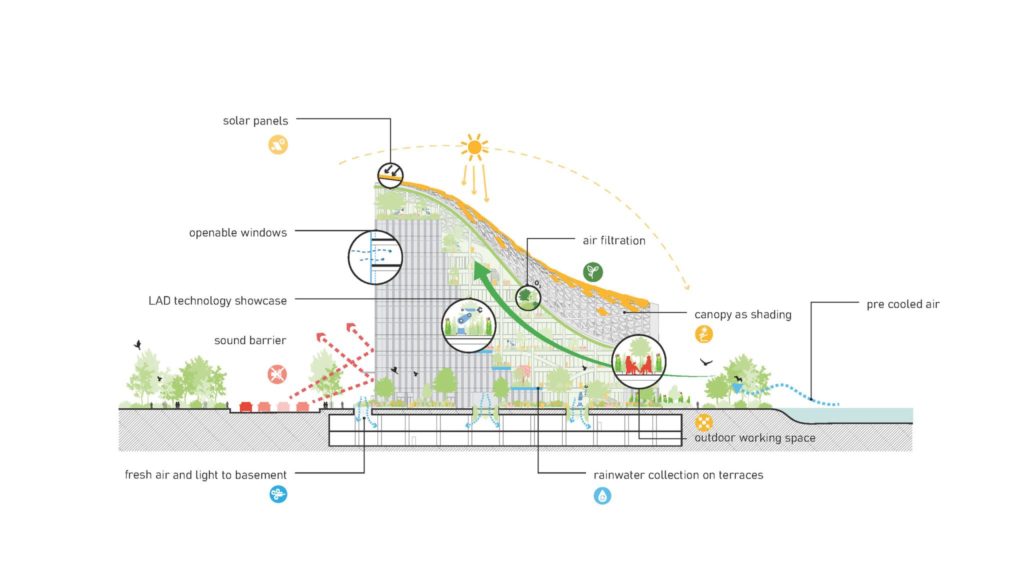
Inside, the building contains the 6,000m2 offices of the LAD headquarters on its upper levels, where there are views to both the lake in the north and the park in the south, and 9,000m2 of labs and co-working offices below. On the first and second floor, the building incorporates an adjustable auditorium and exhibition space, while the ground floor has small retail outlets around its perimeter, and includes three entrances – a public entrance at the courtyard, and separate entrances for the rentable offices and LAD HQ – connected by an “exhibition street”. In its two basement levels, the building has a canteen and parking, but the “agricultural oasis” concept even extends below ground thanks to a number of voids that allow light, fresh air, and greenery to make their presence felt.
Project details:
Architect: MVRDV
Founding Partner-in-Charge: Jacob van Rijs
Partner: Frans de Witte
Design team (competition): Fedor Bron, Fouad Addou, Li Li, Nicolas Garin Odriozola, Alberto Canton, Annalot Brockhoff
Design team (schematic design): Fedor Bron, Fouad Addou, Li Li, Aneta Rymsza, Nicolas Garin Odriozola, Alberto Canton
Director MVRDV Asia: Steven Smit
Sustainability consultant: Peter Mensinga
Visualisations: Antonio Luca Coco, Luca Piattelli, Angelo La Delfa, Luana La Martina
Images: © MVRDV
Area: 18,900m²
Year of completion: 2021
Jacob Van Rijs, Frans de Witte, Steven Smit, Fedor Bron, Fouad Addou, Li Li, Aneta Rymsza, Nicolas Garin Odriozola, Alberto Canton, Anna Brockhoff, Peter Mensinga, Antonio Luca Coco, Luca Piattelli, Angelo La Delfa, Luana La Martina, along with East China Architectural Design & Research Institute Co., Ltd. and Buro Happold.
You might also like:
Asian projects and firms win big at 2019 World Architecture Festival
MVRDV wins competition to design Tancheon Valley project on Seoul waterfront
